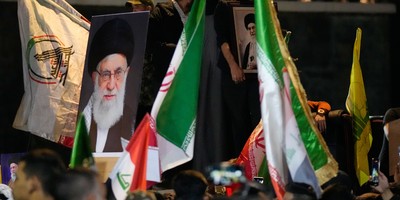Chicago mayors seeking re-election are known to project power.
The power to reward allies, the power to frighten those who dare contribute to political rivals.
What Chicago mayors are not known for is this: Using a tiny voice with a tinge of fear in it, begging protesters to be calm and not "yell over each other."
But that's where Mayor Rahm Emanuel finds himself now, in a tough campaign, pleading for calm on the street, in that tiny voice wound tight, like a spring.
Emanuel returns from yet another one of his globetrotting trips with political donors and business insiders to a Chicago roiling in anger.
A Chicago police killing of a well-known African-American barber in South Shore over the weekend sparked violent protests, with rocks and bottles -- some bottles filled with urine, according to news reports -- thrown at cops.
And about the time Emanuel finally addressed the shooting of barber Harith Augustus on Tuesday, commending his police force for reaching out to the community, news was breaking about another troubling case:
The Laquan McDonald case -- that of the black teenager shot by Jason Van Dyke, a white cop now charged with murder. Van Dyke's trial is scheduled for Sept. 5.
There's an undeniable message in the anger on the streets of Chicago: The cop in the McDonald case goes down for murder or things could get ugly. Emanuel seemed to be acknowledging this in his plea for calm.
On that infamous police video in the McDonald case, Van Dyke is seen shooting the black teenager 16 times.
City Hall sat on the McDonald video, which showed the body jerking on the ground as the shots come again and again. It was held back until after Emanuel was re-elected in 2015 with African-American support.
Recommended
And now Emanuel warns his city against angry voices.
"I hope that we avoid retreating to our respective corners and trying to yell over each other," Emanuel said in his quiet voice, surrounded by police brass. "Take this moment as a city to do something different than other cities and other instances. Take a step back and hear each other, learn from each other and see in our own small ways how to make a difference for the future."
Whose future?
According to Tribune reporting, Augustus didn't have a record, was known only for his haircuts and his reasonable attitude. But he was stopped by police on suspicion he was carrying a gun. He spun away, seemed to reach for his waist, and was shot to death.
The snippet of police video was released in the hopes of quelling the anger before it spread out of control.
Here's the thing.
It took more than year for City Hall to release the McDonald video, which it did only after a judge's order. But it took only one day for police to release the incomplete piece of the Augustus video, without sound, showing Augustus armed and spinning away, reaching for his side.
Police put it out because they had to. And Chicago knows it.
The other day I spent a hot afternoon at that spot at 71st and Jeffery, where Harith Augustus was killed. Another protest was being arranged. But I wanted to talk to neighborhood people before protest mode kicked in. I wanted a sense of things, there on honorary Emmett Till Road, before the neighborhood began responding to TV lights.
Augustus had been shot on the street outside the Jeffery Big Market. In the window signs advertise T-bone steaks for $4.99 a pound, and 99 cents per pound chicken breasts.
A group of men were hanging out in a patch of shade out front. A small balloon had been tied to a thin tree. A card reading "Rest in Peace" lay on the sidewalk, already fading in the sun.
"People are upset, man, and they're going to be more upset the next time," said an older man, putting his hat on sideways, trying to explain the neighborhood's heart. "Not just for this one barber but all times a black man gets killed by police. People more than upset."
He dug into his pocket for change, to buy ice pops for a few kids.
"You have no idea how angry people are now," said the man.
What's your name?
"One-Step."
What's your real name?
"One-Step, that's my name!"
I didn't press it.
"He was a good man, civilian, he cut my hair, he was quiet, wasn't in trouble with the police," One-Step said. He talked about the anger in the neighborhood. "That's the mood, you understand?" he told me. "You see the video?"
Yeah, I saw the video.
"But why the police come up on him like that? What was in their minds singling him out? I've been knowin' him for years," One-Step said. "Never heard him say 10 words though."
I turned to a kid next to him, a teenager in a red sweatsuit, leaning on crutches for a bad leg. I wondered if it was from playing sports, or something else.
You have anything to say?
"He ain't got nothing to say," One-Step said. "I'm saying it. People are angry. You have no f------ idea."

























Join the conversation as a VIP Member